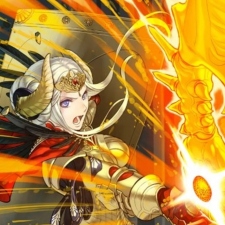Today marks a significant milestone for Nintendo and Intelligent Systems as we celebrate the seventh anniversary of their highly successful mobile game, Fire Emblem Heroes.
Launched on February 2, 2017, Fire Emblem Heroes has distinguished itself as the most lucrative mobile project for Nintendo, surpassing the gross revenue of any other game in the franchise’s history. Through its seven years, the game has adapted to evolving gameplay, metas, and genres, maintaining relevance in a rapidly changing gaming landscape.
From its inception, Fire Emblem Heroes has appealed to both longtime fans and newcomers, successfully drawing in new players who were previously unfamiliar with the Fire Emblem franchise. Across its 34-year history, the Fire Emblem series has seen successful titles, yet none have achieved the level of financial success as Fire Emblem Heroes. To date, the mobile game has generated over $1 billion in revenue, a testament to its enduring popularity and staying power.
Compared to Nintendo’s Switch title Three Houses, which is the best-selling strategy RPG of all time, Fire Emblem Heroes has substantially outpaced its sales and revenue, cementing its status as a major success for the franchise.
Fire Emblem Heroes has become a mainstay in the mobile gaming landscape, outlasting other Nintendo mobile projects and maintaining a consistent fortnightly update schedule for seven years. The game has effectively monetized its player base through evolving mechanics and incentives, ensuring its sustained profitability.
Establishing itself as a game designed for mobile, Fire Emblem Heroes retained the core gameplay formula of the main series while incorporating RPG elements and turn-based battles. The game’s monetization centered around gacha mechanics, allowing players to collect and use orbs as premium currency to summon characters.
Over the years, the game has introduced new mechanics, such as skill inheritance, enabling players to enhance their favorite characters and fostering continued engagement with new character releases. Additionally, regular updates and new character banners have created a sense of urgency for players to spend in order to keep up with the latest units and skills.
Fire Emblem Heroes has expanded its gameplay beyond traditional strategy RPG elements, incorporating various genres and mechanics, including rhythm games, raids, auto-battlers, and community-based modes. The game offers a diverse array of experiences, ensuring that players have diverse incentives to engage with the game and spend on premium currency.
Moreover, the game has implemented an optional subscription service to incentivize spending, providing additional benefits to subscribers and further contributing to its robust monetization strategy.
As a means to drive sales of the main series on console, Fire Emblem Heroes has been instrumental in promoting titles such as Echoes, Three Houses, and Engage. This cross-promotion strategy has proven effective in boosting the popularity of the main franchise.
In light of the game’s seventh anniversary, Fire Emblem Heroes continues to roll out new content and characters, including Emblem Heroes, which offers unique stat boosts and skills. The game maintains its dedication to engaging fans and encouraging ongoing spending to remain competitive in the evolving meta.
Looking back at the game’s journey, Fire Emblem Heroes’ enduring success is a testament to its ability to evolve, adapt, and cater to a diverse player base. As a fan since its inception, I’m excited to see what the future holds for Fire Emblem Heroes and its continued legacy in the gaming world.


